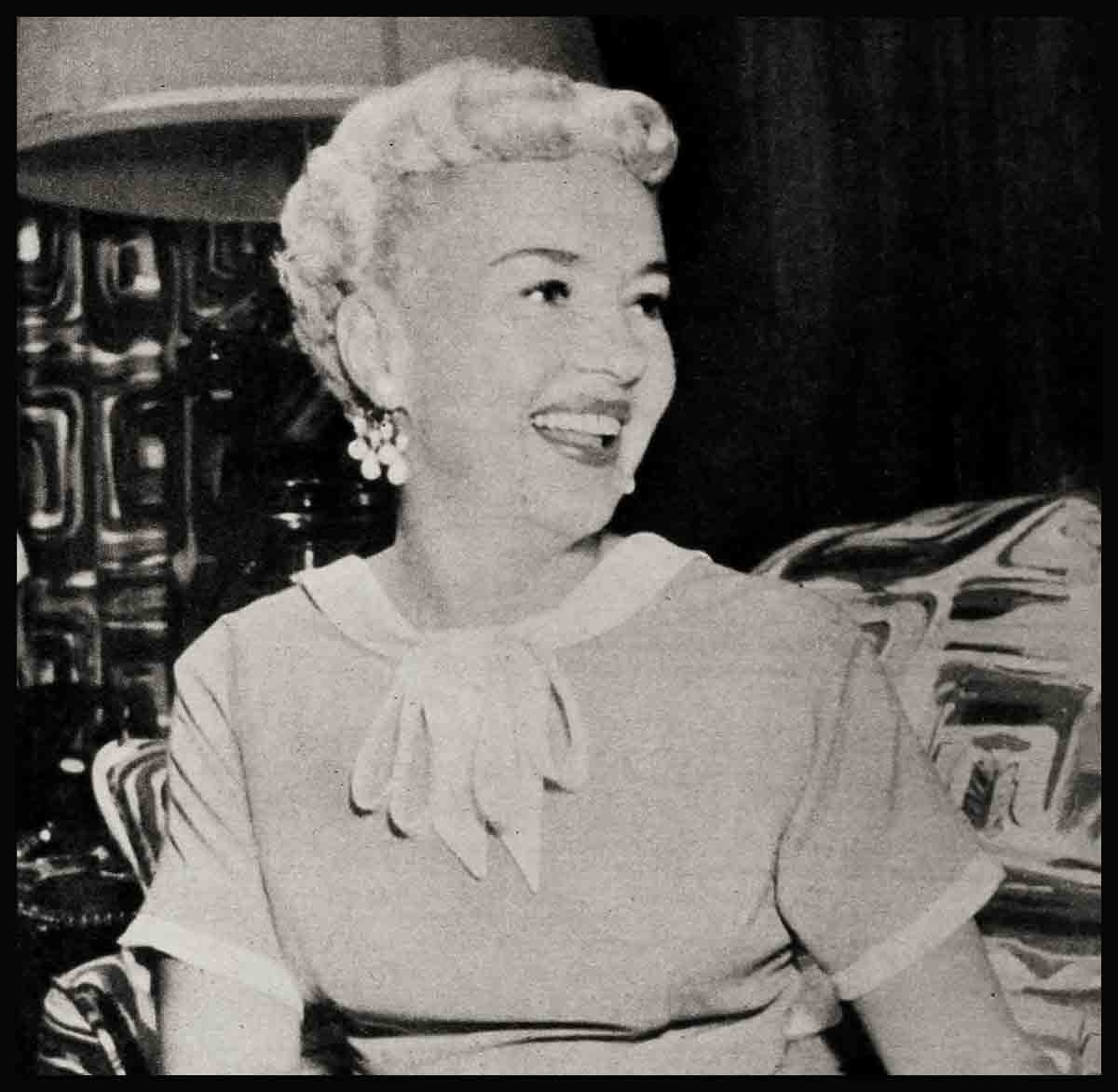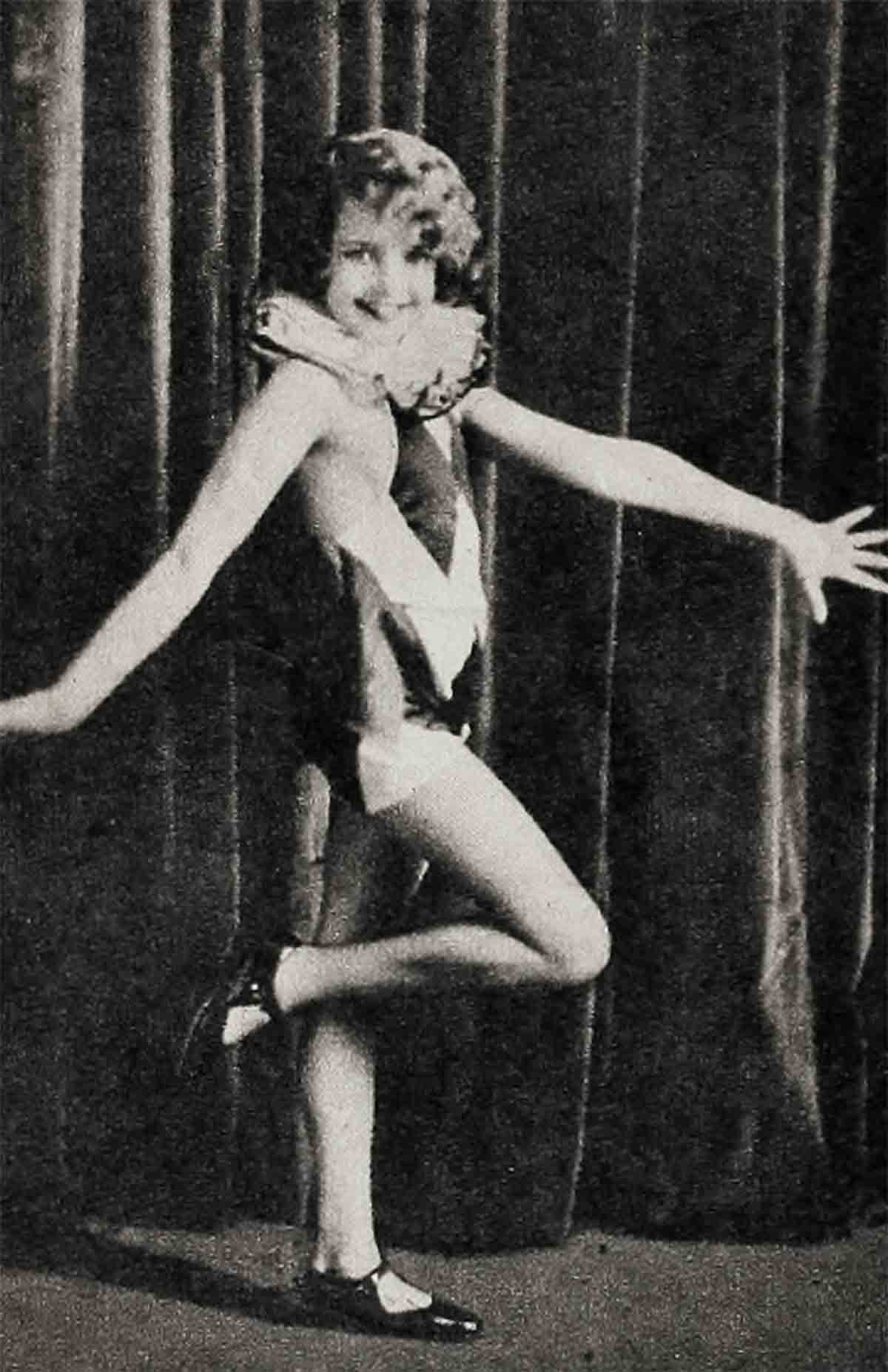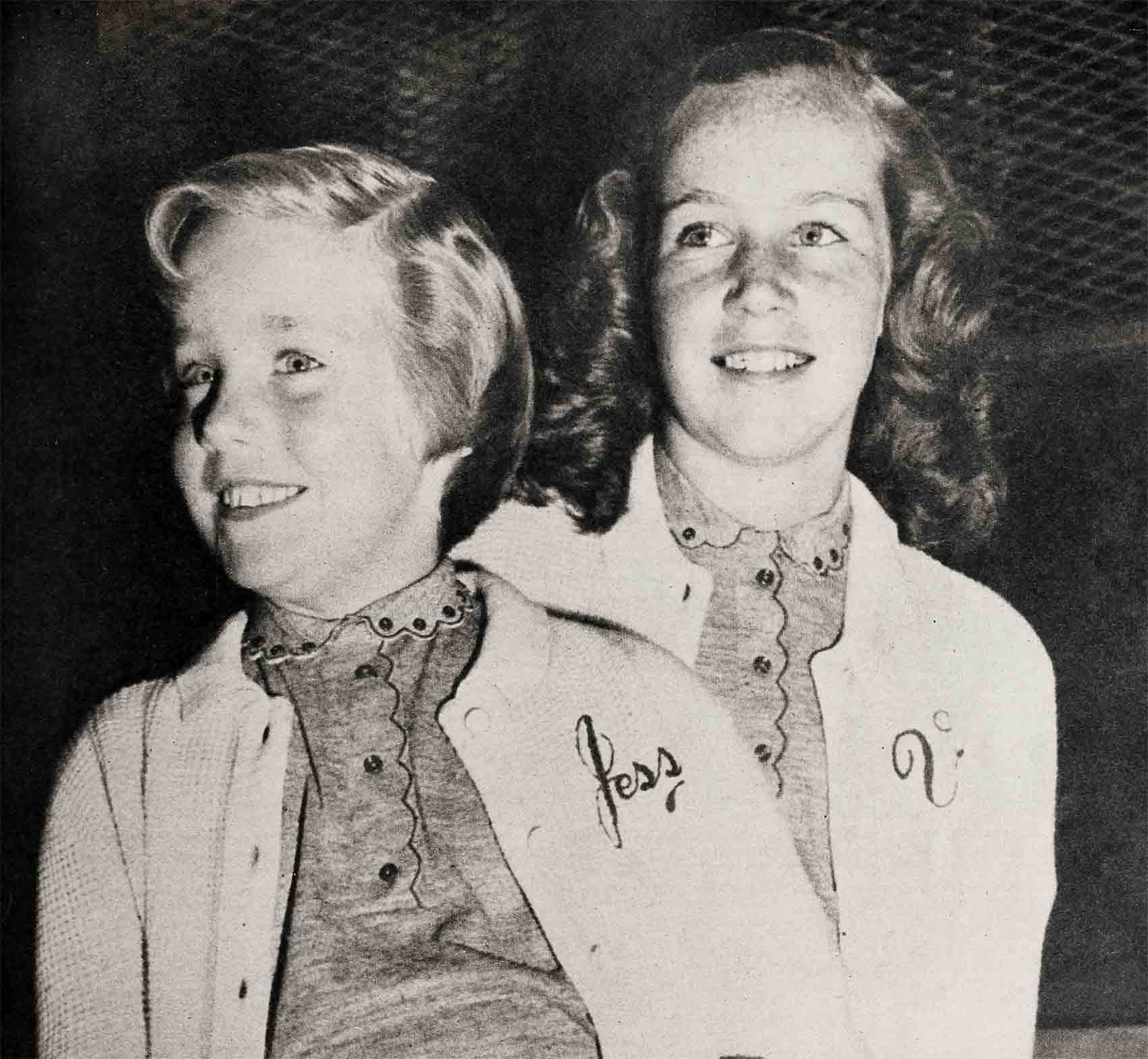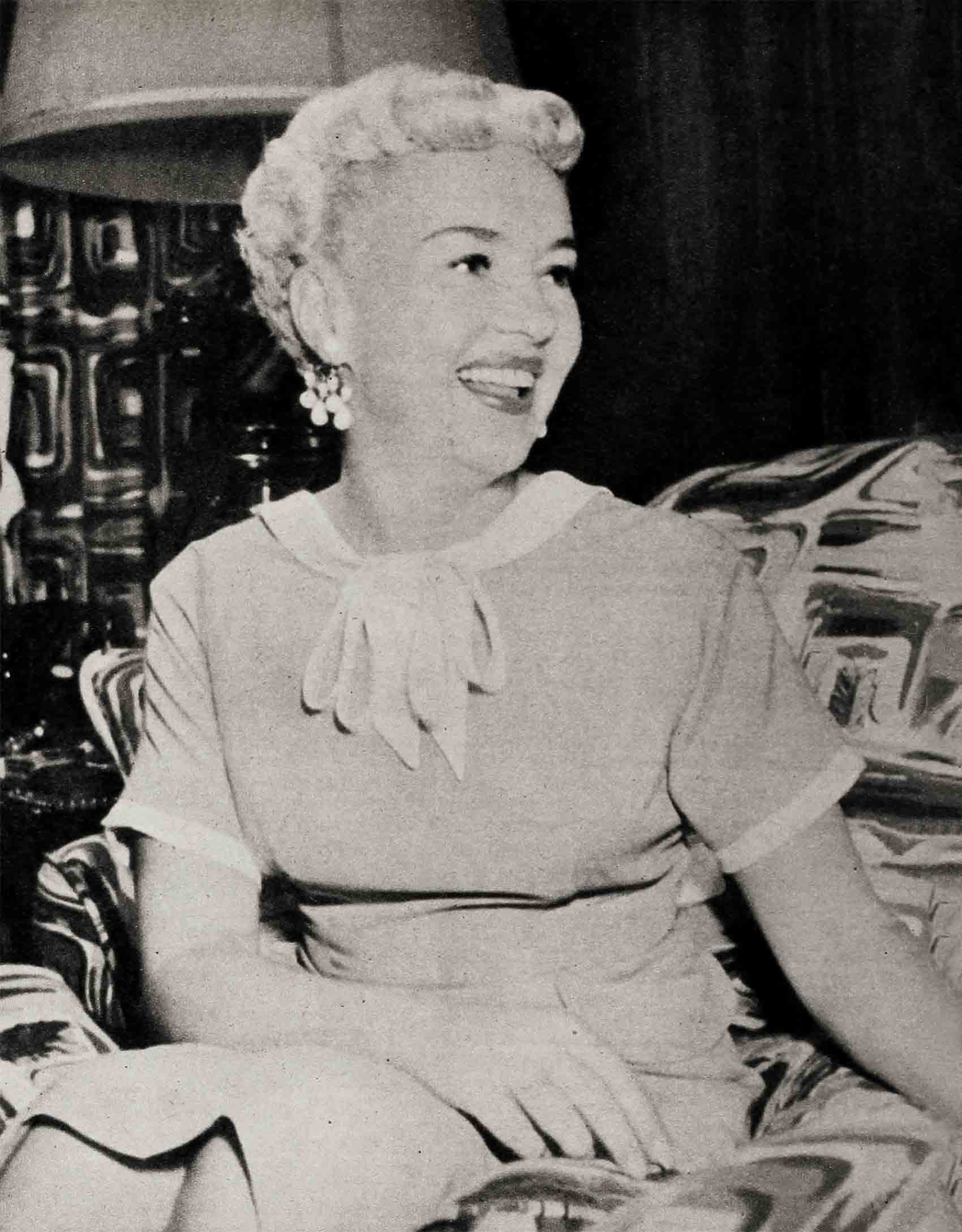
Betty Grable: “The Fun Have With My Daughters”
At the breakfast table last week, nine-year-old Jesse said, “Mom, how old are you, anyway?”
“I’m 102,” said Betty. “Eat your eggs.”
Twelve-year-old Vicki stared as though she were seeing her mother for the first time. “Come on, mother, how old are you really?”
“Thirty-nine,” said Mrs. James and added, “An honest thirty-nine, not a Jack Benny thirty-nine.”
“Suppose,” Jesse mused, “somebody asks us how old you are. Should we tell them?”
“Sure,” said Betty. “Who cares? I don’t.”
She thinks it was the first time her daughters gave any thought to the age difference between them. The girls are quite adult for their years, while Betty appears a fast twenty-eight. Most of the time they seem more like friends than mother and daughters. Their closeness comes from their being together so much of the time. Harry James is away a great deal; on an average of six months out of the year in fact, and while his band engagements seldom keep him away from home more than a month at a time, he never fails to be amazed at the way his daughters are growing up.
From various points around the globe Harry has made long distance calls to keep in touch, timing his calls to catch the girls before bedtime. Bedtime has moved up through the years and Harry can never quite adjust himself to the fact. Just last summer he phoned later than usual; having been detained by business, and was surprised when Jesse answered the phone.
“Why aren’t you in bed?” he said. “It’s almost eight o’clock.”
“Heavens to Betsy, Daddy! We’re just finishing dinner. I’m not a child any more, you know!”
And Vicki proved in her own way that she has become a young lady. She answered the telephone one evening—at which precise point a fieldmouse scrambled through an open door and across her feet. Harry heard her say hello, then a piercing scream, then silence. In her terror Vicki forgot she had even answered the phone and left the receiver on a table. Betty discovered it, hung up, and three minutes later it rang again.
“What on earth—” Harry began.
“She said it was a mouse.”
“But mice never bothered Vicki!”
“You forget she’s twelve now,” Betty.

Life without Father
The girls are accustomed to Harry’s long absences; even Betty has learned through the years of their marriage, to live half her life without a man around the house. The band is Harry’s business, and if it makes for an unusual family life, there is nothing that can be done about it. Vicki and Jesse have never known another schedule; to have their father home at six every evening for dinner would be a new experience for them.
When Harry is home, they make up to him for the long miles that so often separate them. It used to be that Jesse was the Daddy’s Girl; now it is Vicki, for she is old enough to love ballroom dancing and enchanted at having a father who supplies music for it. Harry’s records spin for hours, whether or not he is home; and when he is, he and Vicki often dance together, from waltz to rock and roll. When Harry has a local band engagement and leaves for work in the evening, he is smothered by hugs from both daughters and one night Vicki looked up at him appraisingly. “When I have a real honest-to-goodness boy friend, I hope he’s just like you.”
Harry beams and thrives under the affection, but that is as far as he can progress in fatherly duties. When discipline is needed, when punishment is called for, he falls apart. “Betty, you do something!”
“Oh, come on,” says Mrs. James. “You can at least manage a stern expression.”
Harry shakes his head. “If they were boys I could take them out to the woodshed and give them what-for. But honey, they’re girls! I don’t know what to do with them!” So Betty supplies the discipline.
For Betty herself, the days are no longer so disciplined and busy as they used to be. If her fans wonder why they haven’t seen her on the screen for many months (last picture, How To Be Very Popular) they should understand the delay is Betty’s own doing. “Sure,” she says, “I’ll make a picture. But I can’t seem to get around to it. I was under contract to 20th Century-Fox for fourteen years, on call every minute of every day. Now I work when I feel like working, but I’m not in any hurry. You might say I was never the hammy type. My mother used to drive me to lessons and auditions but those things, and acting, were never terribly important to me. I’ll make a picture soon, I guess, but it’s a matter of getting me going.”
Until she gets going again, here’s her typical day: She gets up at 7, allows herself the luxury of breakfast in bed, served by the one James maid. She joins the girls at their breakfast, drives them to school at 8:15. Returned home, she showers, does her hair, lies in the sun by the pool. Betty loves the sun, claims she could stay in it from 10 to 6 without getting bored. She’s content to stay at home. “I’m not the clubwoman type—to tell you the truth, other women frighten me to death.” She goes out happily if a local track is operating or there’s work to be done at the ranch. She leaves the house grudgingly if it’s a radio or TV appearance or anything to do with career. Otherwise she stays home, picks up the kids at school in the afternoon, joins them in the pool for the remainder of the day. They have dinner together, sometimes go to a neighborhood theatre to catch a movie, sometimes have a sundae afterward, more often go home to an early bed. “I conk out early what with getting up at 7—practically go to bed with the girls.”

The whole gismo
Betty never did like the necessity of leaving them to go to the studio, and feels fortunate these days that she can be with them so much. “I think it’s even more important now, when they’re turning into people. When they had a nurse I couldn’t help resenting her. I’ve always ordered their meals, bought their clothes. I never had qualms about the responsibility of motherhood. I like it. I want to have all of it—the whole gismo.”
She is getting the whole gismo. While the girls are close (they share one bedroom from choice), they are in personality like day and night. Vicki is the quiet, reserved one, Jesse the outgoing, independent type. “Vicki is like Harry, Jesse more like me—a character—or at least the way I used to be.” Vicki is an A student and loves school; Jesse shrugs at the necessity of an education and takes in stride the curse of following a more studious sister through the same school. Vicki is putting pink crayola on her lips, has announced her yearning for a straight skirt ‘instead of those childish full things.’ She keeps a diary, replete with lock and key, and has recently become very withdrawn.

This worries Betty. “She likes to be by herself so much—I’d probably never see her if it weren’t that she likes me to fix her hair. And she’s so secretive.” It’s a new wrinkle for Betty, who has always encouraged the girls to confide in her, to be completely honest. She has told them, “Whenever you get into trouble, if you’re truthful with me I won’t punish you. I promise you that. But just tell me.” And now she has Vicki at home in body, but in spirit miles away, on a plane that mothers can never reach.
Sometimes Betty looks at Vicki now and realizes with a sense of shock that when she was Vicki’s age she was passing for fourteen and dancing in a chorus line. “I didn’t have to work. My father was a successful stock broker. I guess Mother just wanted me to be highly talented. Whatever the reason, I used to resent it. I don’t now. It’s given me a happy life, and if the girls want the same thing, it will be all right with me. But it must be their own choice.”
At the moment they both want to be nurses, dreaming of saving humanity, but Betty figures this to be a passing fancy. She herself wanted at one time to be a nurse and deems it a blessing to the memory of Florence Nightingale that she didn’t retain the ambition, inasmuch as she can’t stand seeing anyone injured and goes blocks out of her way to avoid the scene of an accident.
If they eventually choose show business, they will enter it almost as naively as though they had grown up in Hatsoff, Texas. At home, Betty and Harry have minimized the angle of show business. They don’t run with the Hollywood crowd, have never cared for parties. When they entertain friends at a barbecue, the friends are non-professional. Betty is always referred to around the house as Mrs. James. It is as if the girls disassociated their parents with show business. Not that they aren’t rabid movie fans. The other day Vicki and Betty were lunching in the Brown Derby when Dick Egan walked by their table. Vicki’s hamburger almost ended up in her lap.
“Mother!” she howled. “Look! It’s him!”
“It’s who?”
“Richard Egan! Isn’t he wonderful?”
“You’d like to meet him?”
“Oh, Mother, do you know him? Could you really introduce me?”
It’s like that with both girls. It seldom occurs to them that their mother is Betty Grable, movie star. They might realize she knows these fabulous stars they’re always reading about, but it doesn’t sink in that their mother is one of the most famous of them all.
“I think if anybody ever came right out and mentioned it to them,” says Betty, “they’d die of embarrassment.”
Betty Grable’s domesticity begins to show when she talks about college for her daughters. “I think it’s a waste for girls, except for the social life. I’d like them to attend a finishing school where they’d learn to sew and cook. I never learned those things and I wish I had.” She knows a husband appreciates such talents in a wife and is made happy by the aroma of a baking pie or the sound of clacking needles, and knows also, despite her own success and fame, that a woman’s prime happiness is found in being a good wife and mother.
THE END
—BY JANE WILKIE
It is a quote. MODERN SCREEN MAGAZINE OCTOBER 1956




